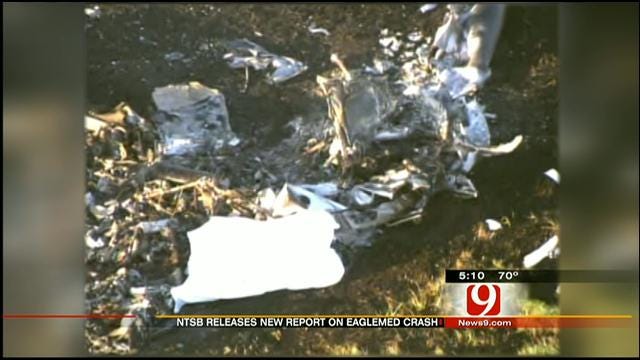NTSB: Helicopter Pilot's Medical History Questioned After Fatal Kingfisher Crash
The National Transportation Safety Board has found issues with the medical condition of the pilot of a medical helicopter that crashed in 2010 near Kingfisher.Thursday, May 9th 2013, 9:55 am
The National Transportation Safety Board has found issues with the medical condition of the pilot of a medical helicopter that crashed in 2010 near Kingfisher.
The helicopter, a Eurocopter AS 350 B2 operated by EagleMed LLC, crashed at about 7:25 p.m. on July 22, 2010 while on a flight from Integris Baptist Medical Center in Oklahoma City to pick up a patient in Okeene.
Pilot Al Harrison and nurse Ryan Duke were killed in the crash. Paramedic Michael Eccard survived.
7/22/2010: Related Story: 2 Dead, 1 Injured in Medical Helicopter Crash
As expected, the NTSB's newly-released Factual Report contains no conclusions about the crash. However, it does contain two findings that will likely figure prominently when the NTSB eventually releases its Probable Cause Report on the incident.
Read the NTSB's Factual Report on the crash.
First, the Factual Report indicates the chopper impacted trees while the pilot was imitating another pilot's attempt to chase coyotes.
The surviving paramedic told investigators that during the flight he had noticed one of the aircraft's doors was ajar. He informed the pilot that he was leaving his seat to close the door. After securing the door and returning to his seat, the crew began discussing another pilot flying on a coyote hunt. The paramedic reported that the pilot made a statement similar to "like this... (with some laughter)" and then the pilot tilted the helicopter's nose down.
The paramedic told investigators the pilot then "pulled up on the collective" and the helicopter struck a tree. The helicopter then struck the ground and the paramedic, who was not secured in his seat, was thrown through the windscreen. He crawled away from the wreckage and used his cell phone to call 911.
Second, the NTSB says the pilot was being treated for several medical problems, none of which he had reported to the FAA. The NTSB says he had several prescription drugs in his system at the time of his death.
According to the report, the pilot had been prescribed multiple medications since at least 2007, when he reported to his personal physician that he had bronchitis, hypertension and sleep apnea. The NTSB says he was also being treated for restless leg syndrome and pain.
The NTSB says the pilot reported to his personal physician that he was experiencing more pain and the doctor prescribed stronger pain medications, including prescription narcotics and benzodiasepines.
The NTSB says the pilot had been prescribed the following in February 2010:
- Caduet (hypertension)
- Omeprazole (gastroesophageal reflux)
- Meloxicam (non-steroidal anti-inflammatory)
- Lunesta (sleep aid)
- Norco (hydrocodone/acetaminophen)
- Baclofen (muscle relaxant)
- Valium (diazepam, a benzodiazepine)
According to the toxicology report, the pilot had numerous prescription drugs and an over-the-counter medication in his system, including:
- Acetaminophen
- Chlorpheniramine (antihistamine)
- Diazepam
- Dihydrocodeine
- Hydrocodone
- Temazepam (insomnia)
According to the report, the pilot was never treated for his sleep apnea. The NTSB says the pilot had not reported any of his conditions and prescription medications to the FAA.
The Factual Report is the NTSB's second of three reports on the crash. The final one, called the Probable Cause Report, could take months or even years to be issued.
More Like This
April 30th, 2025
Top Headlines
August 11th, 2025
August 11th, 2025
August 11th, 2025










